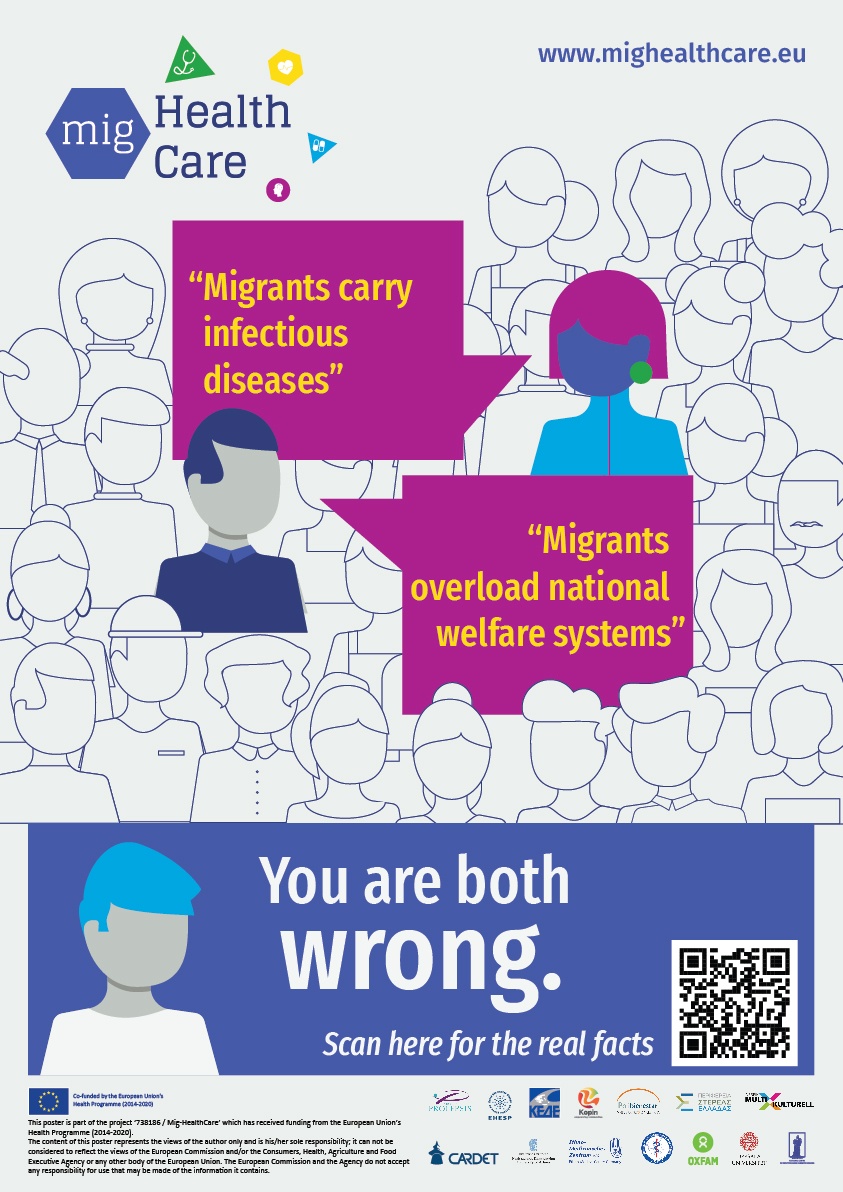Models of community health and social care and best practices
Models of community health and social care and best practices
The Mig-HealthCare partners reviewed and evaluated relevant interventions that address health issues among migrants/refugees. Some of these interventions which were positively evaluated and are considered as Best Practices could be used in different settings.
The full report is available here.
Literature review report
Literature review report
There is increasing interest and concern about migration to Europe from non-European countries and its impact on the European social healthcare systems. It is therefore important to look at the evidence available on provision and access to health care for migrants and refugees. This report provides a review of existing evidence on migrant & refugee access to health care and discusses main health issues among migrants/refugees.
The aim of this report is to provide an overview of evidence made available by academic articles and grey literature on the topic of health care and migration in the 10 European countries involved in the project. The specific research questions were:
- What is known about the physical and mental health status of migrants and refugees in the EU member states?
- What is known about the health care needs of migrants and refugees in the EU member states?
- What health care and social services are available for migrants and refugees?
Results: Despite the aspiration to ensure equal access and provision of healthcare, there is evidence of inequalities between migrants and non-migrants in healthcare. Different countries tend to focus on different aspects of migrants’ health, hence comparison and generalization across countries is difficult. Most of the existing evidence is fragmented and scattered. However, it seems that there is an unmet need especially when it comes to mental and dental health. Legal barriers exist in equal access to health care, as well as language issues, discrimination, overuse of emergency services and underuse of primary health care.
Please find the relevant report here.
Scenarios - prediction model
Scenarios - prediction model
Mig-HealthCare research (literature review, focus groups, survey, mapping of services and best practice) will be used to design a prediction model – scenarios to predict the health care services needed to address and respond to the needs of different groups of vulnerable migrants and refugees. Different scenarios will be discussed regarding the demands of EU health care and social services in the coming years. Visualizing future trends based on the current situation is a powerful tool to prepare services for future problems.
Please find the relevant report here.
Survey and interview findings
Survey and interview findings
This report discusses the results of the participatory research conducted within the Mig-HealthCare consortium to explore the physical and mental health of migrants and refugees in the consortium countries which include Greece, France, Malta, Germany, Austria, Italy, Cyprus, Spain, Sweden and Bulgaria.
This research aims to cover the gaps concerning less explored health issues (mental health, dental health, gynecological issues, dermatological issues etc) as well as needs and expectations of health care providers.
More specifically the following questions are addressed:
- What is the physical and mental health status and the main physical and mental health problems of migrants/refugees in the EU? Some areas are widely unknown. For example we will explore mental health, dental health, obstetrics and gynecology issues among migrants/refugees
- Which differences are observed between different groups (migrants living in the community, migrants/refugees living in organized facilities, irregular migrants/refugees, vulnerable groups such as women and children) and why?
- What are the differences among countries in Europe and where are the challenges more marked?
- What are the needs, facilitators and barriers, as viewed from the providers who offer health care and social services to migrants/refugees in Europe?
Original research included:
- Focus group discussions and interviews with health care providers in each of the countries of the consortium. In total between November 2017 and April 2018, 20 focus group discussions and 19 individual interviews were conducted with health care providers, policy makers and representatives from NGOs, including volunteer workers in the 10 countries of the consortium.
- A survey using a purpose made questionnaire answered by migrants/refugees in all participating countries. In total, 1,325 questionnaires from 10 member states were collected.
Please find the relevant report here.
Pilot reports and recommendations
Pilot reports and recommendations
The consortium piloted parts of the Mig-HealthCare roadmap and toolbox as well as the algorithm. The results are available in this report.
Scientific articles and conference publications
Scientific articles and conference publications
Throughout the project the consortium engaged in rigorous original research in all the consortium countries. Partners conducted literature reviews, focus groups research with health care professionals, a survey with migrants/refugees, systematic reviews to identify promising interventions to improve health outcomes.
One of the main aims of the consortium was to increase visibility of the research findings through scientific publications and conference presentations.
This report presents these publications.
Mig-HealthCare EU Virtual Info Day
Mig-HealthCare EU Virtual Info Day
The Mig-HealthCare EU Virtual Info Day was held on June 23rd, from 11:00 to 14:30 (10:00 – 13:30 CET). It was initially planned to take place in April 23rd 2020 in Athens, Greece. However due to the COVID-19 pandemic it was rescheduled and took place virtually. The event was organized by the Institute of Preventive Medicine, Environmental & Occupational Health, Prolepsis, on behalf of the Mig-HealthCare consortium. Members of Prolepsis team provided technical support ensuring that both internal and external communications ran as planned.
The aim of the EU Virtual Info Day was to disseminate the research findings and educational tools produced by the project consortium and to raise awareness within the European public. See the report here
Download the report here.
Final Report and recommendations
Final Report and recommendations
Coming soon...



